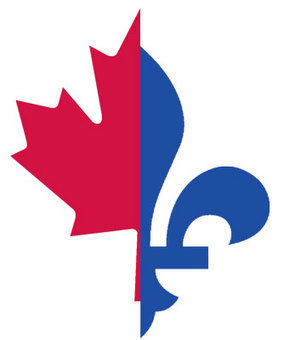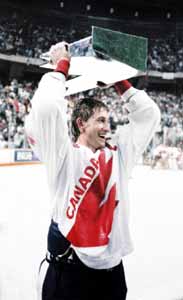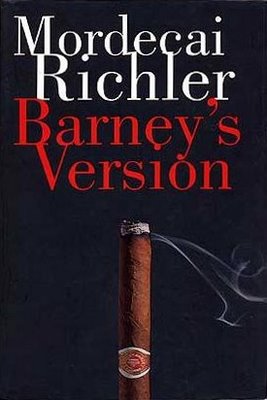Great Debate: Team Rest-of-Canada v. Équipe Québec
 As I’ve alluded to before, I used to work at a Very Large Bookstore in downtown Toronto and my co-workers and I often devised games to entertain ourselves on slow days.
As I’ve alluded to before, I used to work at a Very Large Bookstore in downtown Toronto and my co-workers and I often devised games to entertain ourselves on slow days.
A popular one amongst the hockey fans on staff was: Who would win in a best-of-seven series between an all-time all-star lineup of players from Quebec and the Rest of Canada?
I mean, let’s not kid ourselves. If you pit an all-time Canadian team against an all-time from any other country team it’s a pretty straight forward answer: the guys with the maple leaf on their chest. Seriously, only an all-Soviet/Russian team would avoid the sweep.
But pitting Canadians against Canadiens? That is a tough call. At first glace, you've got to give the advantage to Quebec's goaltenders. Jacques Plante. Patrick Roy. Martin Brodeur. Roberto Luongo. La Belle Provence has a sterling history of producing world-class goalies.
Naturally, defence appears to favour the Rest of Canada. Naming off the National Hockey League's best defencemen of all time reads a lot like the bench of Team ROC.
Up front is where things get tricky. Gretzky against Lemieux. The Rocket versus Stevie Y. It's a dead heat.
The rules are simple:
- Each team gets four lines of forwards, six defencemen and three goaltenders.
- Any player from the National Hockey League’s history is eligible.
- These theoretical rosters are composed of the players in their primes. Bobby Orr's knees are in perfect shape and Michel Goulet hasn't been concussed.
- It’s Rest-of-Canada versus Quebec, not French Canada versus English Canada. For example, Dion Phaneuf, a Francophone, could theoretically play for Rest-of-Canada, as he’s from Edmonton. Similarly, Doug Harvey is from Montreal so he’d play for Quebec, even if he is maudit anglais.Of course, English against French can be a fun exercize as well, but we’re trying to keep things politically sensitive on this blog.
- No, Brett Hull doesn’t count.
I want to know who you think would win, and why. If you’re feeling ambitious, post your rosters as well.
Here are my picks for the rosters, as well as the winner
Team Rest-of-Canada
Forwards:
C - Wayne Gretzky
Steve Yzerman
Gordie Howe
Sidney Crosby
Mark Messier
Bobby Hull
Phil Esposito
Ron Francis
Joe Sakic
Mark Recchi
Doug Gilmour
Adam Oates
Defence:
Bobby Orr
Larry Robinson
Larry Murphy
Paul Coffey
Scott Stevens
Chris Pronger
Goaltenders:
Terry Sawchuck
Ken Dryden
Glenn Hall
Équipe Québec
Forwards:
C-Maurice Richard
Henri Richard
Mario Lemieux
Marcel Dionne
Guy Lafleur
Luc Robitaille
Denis Savard
Pierre Turgeon
Gilbert Perrault
Jean Ratelle
Jean Beliveau
Michel Goulet
Defence:
Ray Bourque
Doug Harvey
Denis Potvin
Serge Savard
Guy Lapointe
Jacques Laperriere
Goaltenders:
Patrick Roy
Martin Brodeur
Jacques Plante
Winner: Team Rest-of-Canada in seven games.
 Led by captain Wayne Gretzky, Team Rest-of-Canada would win because they would abuse their biggest advantage: defence.
Led by captain Wayne Gretzky, Team Rest-of-Canada would win because they would abuse their biggest advantage: defence.
With goalies and forward pretty even, the largest disparity is clearly at the blue line. Yes, Bourque and Harvey are two of the best defenders of all time, but they aren’t the best.
Bobby Orr is the best offensive-defenceman of all time and Larry Robinson is the best defensive-defenceman ever. That one-two punch, coupled with the depth of their rearguard corps gives ROC a real advantage.
Rest-of-Canada’s defence is also much bigger than the average forward for Équipe Québec. Although the Richards might be able to slip by the likes of Paul Coffey and Larry Murphy a few times, they’d be exhausted when it comes time to lace ‘em up for Game 7.
Also, ROC's defence would be able to jump up into the attack. Obviously, Orr was capable of scoring just as many points as any forward for Quebec, and Coffey would be able to keep La Belle Provence's defence honest too.
One of the big surprises is that ROC is actually pretty good between the pipes. Yes, the case can be made that one of Roy, Brodeur or Plante are the greatest goaltender of all time - but the same can be said of Sawchuk. Further, Dryden and Hall aren't exactly slouches. Sawchuk, coupled with the reliable defence in front of him, would be more than enough to stop the best that Quebec has to offer.
Up front would still be a dead heat. The Rest-of-Canada couldn't possibly match the flair and play-making ability of Quebec, but with talented and tough forwards like Howe, Gilmour and Recchi bearing down on them on the forecheck, the blue-and-white would feel rushed and pressured on most of their shifts.
